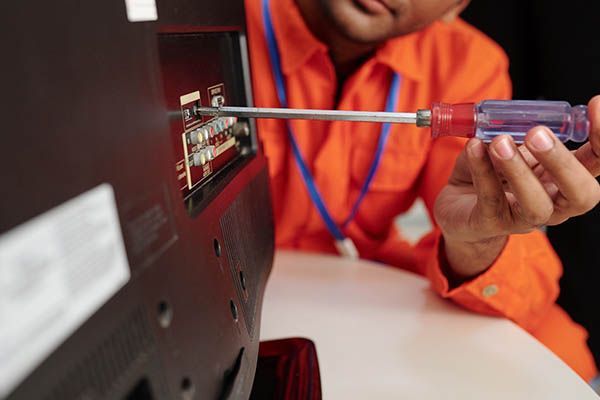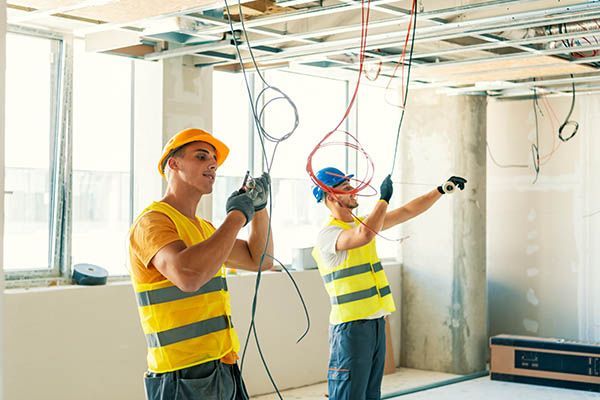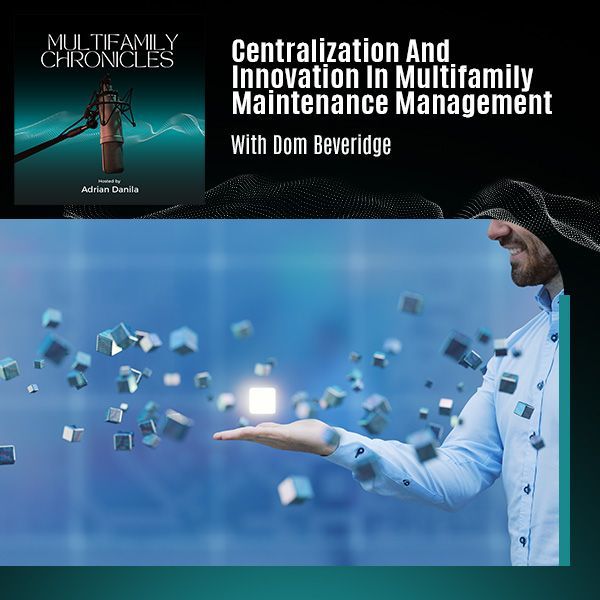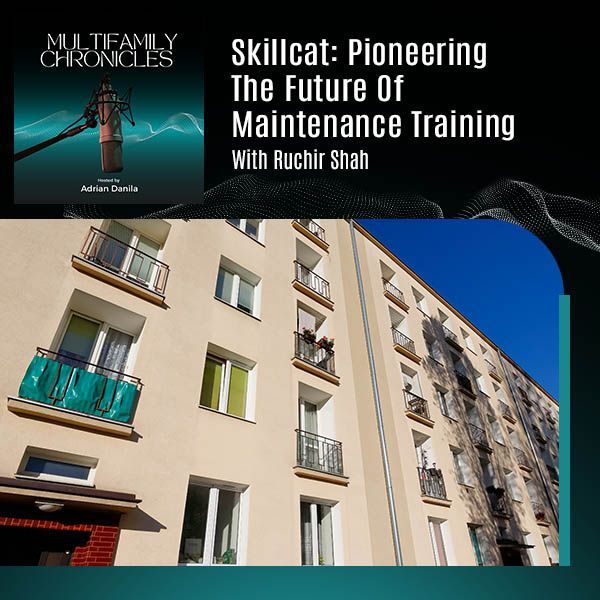What The Apartment Maintenance Technician Trade Needs Right Now With Paul Rhodes
The apartment maintenance technician trade is facing unprecedented challenges right now. Aside from the labor shortage that the industry has been grappling with for some years now, we also have an observable aging of the service workforce. Add to that the challenge of convincing the younger generation that being an apartment maintenance technician can actually be a fulfilling career choice. Paul Rhodes discusses all of that and more in this episode. Tune in and learn from his insight into what the industry needs right now in order to thrive in these changing times.
---
Watch the episode here
Listen to the podcast here
What The Apartment Maintenance Technician Trade Needs Right Now With Paul Rhodes
In this episode, my guest is Paul Rhodes. Paul is the Director of Maintenance Operations with Life Properties. Welcome to the show, Paul.
Adrian. thanks for having me.
Paul, for the people that don't know you yet in our industry, please introduce yourself to the couple of them that are out there and hopefully, they will be reading this episode. Tell us a little bit about yourself and your background.
I'm the Director of Maintenance Operations with The Life Properties. Before that, my claim to fame, if it were fame, is I was the National Maintenance Instructor for the National Apartment Association Education Institute where I spent nine and a half years traveling around the country, working alongside the National Apartment Association, teaching maintenance guides and gals skills to do the job. Before that, I ran the training department for HD Supply, wrote and developed a lot of the training that to my understanding, they still use some of it.
Before that, going even further back, I ran maintenance on multiple properties here in the Atlanta area and started way back in 1996 or 1997 as a groundskeeper, what we would commonly call a porter or a groundsman on a property right here in Roswell, Georgia. I've been in the apartment industry for roughly several years and have held every maintenance position, including a contractor where at one point, I spent a year building and remodeling swimming pools in both residential and apartment communities. By way of a background, it's a very varied and diverse background that I've done my best to have a great time with in every position that I happen to help.

That's one of the reasons why I want you to come on the show because there's so much for our audience to know from you. I wanted to start with the first topic of our conversation. It's well-known by everybody out there not just in our industry as the Great Resignation. A lot of the employees are seeing that there are a lot of opportunities out there and they're considering leaving their current jobs to go for better-paid opportunities and career advancement. I'd like to start with, how did this whole thing start? How did we get here? Where are we heading? How do we manage as an industry?
We've got fourteen hours to cover how we got here and then we'll spend a couple of years figuring out where we're at. I'm not sure how we got here. To be honest, as a leader, I'm only interested in how we got here enough to figure out a prescription to not do it again. I'm not a sociologist or a psychologist so I don't have the magic answer. I do think to some extent, a cultural shift in the entire country, partially to blame on COVID and the pandemic that is turning endemic, caused a lot of us to refocus and shift where our career priorities are and what we need to do.
Also, in addition to the career priorities, there is a change in the job like the physical tasks that maintenance technicians ended up having to do. An example of that is the pandemic started and things shut down in March 2020. Instantly, I went from having nine months of scheduled training where I was traveling around the country and doing CAMT, the training for the Certificate for Apartment Maintenance Technician class. I was prescheduled out nine months full of classes. When the shutdown occurred overnight, every class was canceled, no lie. Within two days, every apartment association and class that I had on the books was canceled.
My job description was, "Paul, you go somewhere and stand up in front of a group of people." Now, you can't stand in front of a group of people. That tells me that I've got to change something in my job and career. I ended up looking and finding a fantastic company to come work for in a position where I changed my career path. It's related but it was a different change in my career. In the maintenance industry, how much of what we're experiencing is a result of that? If we think of the timeline from March 2020, until realistically, it was May or June of 2021 that the vaccines got rolled out and everybody began relaxing access into our residence apartments.
Suddenly, we went for almost overnight having a structured preventive maintenance plan. Most properties and the organized properties, the communities would have maintenance being performed in that apartment at least twice a year, changing air conditioning filters, smoke detectors, all of those normal things. Instantly in March 2020, that's it. You can't go into your residence apartment and that continued for a year. With the majority of our communities, we did no preventive maintenance. What's the byproduct of that? What is the unintended consequence of that? We have work orders that in a sense, we told our residents, “We don't want your work order. We're not coming in to fix it because of the pandemic, germ and COVID.”
Right, wrong or indifferent, the result was all of the fear stoked and justified but the reality is how many of our communities a maintenance technician has still not been in that apartment? I'm not just talking about your management company or my management company but across-the-country apartments. The reason why I went into that depth or long timeline is what has changed about the job or the role of an apartment maintenance technician that was not the way it was before. That aspect of the Great Resignation is one thing to consider.
A second thing to consider is when families came home, the kids couldn't go back to school and somebody needed to watch the kids, how many of our maintenance technicians are older in their late 50s and 60s from an aging standpoint? How many of them have essentially retired and those vacated places have not been filled? As a wide industry, is that an area or an aspect that we're actively seeking? I don't have an answer to that.
There was an article I was reading that talked about the fact that from the age group of all of the labor and if I remember right, this came from the Bureau of Labor Statistics, there was a 3% drop in employees in the 55 and up category. Meaning, there were more people, 55 and up, in the workforce before and now there's a 3% drop. Three percent doesn't seem like much until you spread it over the millions of people in that age category that were working and now have taken early retirement. The reality is that in the apartment maintenance industry, the median age for being a maintenance worker in multifamily and across all the trades, the medium and age for all of that has been gradually increasing higher.

My question is then if all of that is taken into account, how do we solve it? Meaning, what can we do? You spoke here with Sarah Thompson, our internal recruiter and she has a brain for that. My giftings are not in finding candidates. I would like to believe that what I tend to do is develop people once they're already here. Speaking with her, what can we do about attracting those to our industry and by extension, to other trades that we call on?
This isn't just an issue with being an apartment maintenance technician. It's an issue for the electricians, general contractors, drywall, painting and all of those other trades that we need to use to support our industry, especially with our aging buildings and all the deferred maintenance that has occurred because we haven't been able to get into these apartments. I don't know that I have a magic bullet answer but those are the topics that are at the top of my mind as far as how to deal with the Great Resignation and hopefully, come up with some ideas for getting past it.
You brought up several very interesting and solid points. One is COVID, pre-COVID and life after COVID. People are seeing their priorities shifting. Although before, this was just work, the number one thing that most people were thinking about or focusing on. Most of the time during the work week, we're pausing a lot more and think, "Is this right for me and my family?" Is shifting on seeing priorities necessary? In a way, we see the priorities, because although most people need to provide, it's still something that we have to do.
What we do is work producing but at the same time, we're looking for ways to find more time to spend with our loved ones. It's a very unfortunate thing that COVID cut those relationships very short. A lot of people lost loved ones. That's a very tragic thing and something that will shift a person's thinking and priorities. They will see their priorities differently. We have to realize that. That happened a lot even though there were maybe individuals that were not directly affected but had very close friends or family that went through this tragedy.
As a consequence, they're approaching work-life balance differently. I'll say almost the opposite of the way they used to. Another great point that you brought up is the aging of the workforce. We as an industry and I think other industries too had part-time attracting new blood. How do we attract younger generations to come and embrace the trades? You can make a great living. You use your personal example. You start as a groundskeeper so did I. I spoke with Mark Cukro. He's one of the very well-known trainers. He started the same way as you as a groundskeeper.
You can actually make a great living if you embrace the trades.
There are so many stories in our industry, especially on the maintenance side, where individuals like us that hold maintenance director and corporate level positions started at the very ground and worked our way up. How do we find individuals with that drive? How do we get the younger individuals to be interested to take this as a career and understand that this is not just a job? I could make a living and a career. In 15 or 20 years, I could become the top person in a maintenance department or maybe a large company with 10,000 to 15,000 apartment homes managed.
To be the head of maintenance for that, that's a huge deal. I always make this comparison. A service manager is someone that comes manages $60 to $70 million worth of a real estate. A money manager is someone that handles people's retirement funds. If they ever get to manage $60 to $70 million worth of retirement money, they're a very accomplished person. That's a big deal. I always make this comparison because people might not realize that it's not just overseeing a staff of 4, 5 or 7 individuals or overseeing operations for 300, 400 or 500 apartment homes but it's the value that real estate has, which is a staggering number. It is a lot of responsibility.
When you multiply that and say, "Maintenance Director for Life Properties, you probably have billions of dollars’ worth of real estate that you oversee," that is not a small thing. That is a huge deal. You earn it and work your way up to it but then it comes with a lot of responsibility. It's a very important position in an organization like yours and there are so many others just like yours. One of the reasons why people might consider different careers is company culture, the type of environment that they're part of, how they're being treated and how they feel they're being treated. Do you agree that culture plays an important role in people's decisions of whether they choose property management or they want to go somewhere else?
I don't think so. The reason why I say that is in my mind, you're referencing two different things. You've got a career and a company culture. A career being a maintenance technician, a maintenance supervisor or providing maintenance in a real estate environment is a career that is transferrable from company culture to company culture. You've got the big names and smaller names. You've got the huge management companies that own and operate their properties. You've got management companies that specialize in third-party management or fee management. You've got the smaller mom-and-pop type organizations. They buy single-family homes, duplexes or fourplexes. They rent that out. It's all rental community.
In every one of those situations, you have to have somebody that's going to maintain the building. Every one of those little subdivisions or organizations has a separate culture. Whether I'm going to be a maintenance technician for culture or company A, B, C or D or family E, F and G, that's two different things in my mind. I do agree with you. The company culture is huge but only as much as you're deciding to work for management company A or group B. To back it up to that career level, job level or trade level, that may be one thing that we haven't quite figured out yet as an industry. It's the same thing that carpenters, steamfitters, plumbers and all of the other trades are trying to figure out as well.
I tend to think along the lines of Mike Rowe here, the host from Dirty Jobs. He's got the Mikeroweworks Foundation. The whole focus is that for a fulfilling life and if we're going to have a career, then that requires an understanding that you do not have to have a college education to be fulfilled in life and have a meaningful career, even a career that can allow you to provide for your family and live a comfortable life. Being in this industry for several years, this is a fantastic career where I've gotten to meet some of the most wonderful people in.
You, Mark Cukrom and others within the organization have worked themselves up by title or job responsibility, starting at the low of the entry-level and low-skilled position that we started as. It's a career path that you can take that does not require education. I have a high school education, that's it. I have no formal secondary education at all. I'm a nerd who likes to read an awful lot and finds enjoyment in applying whatever I read. In the process of applying that, I need to figure out more situations and apply those situations and have been given challenges. A lot of times, those challenges I succeed at but not always.
Each and every time, even if I didn't make it, I still applied the lesson I learned when I failed and moved ahead. If somebody is looking for a career that gives you the ability to do that, I'm a huge evangelist for being a maintenance technician. It is the most wonderful thing. I love it. It is great, especially for someone like myself that was a huge fan of comic book superheroes. I want to be a superhero. I'm just not good enough to be a doctor, nurse or somebody in our frontline superheroes. Instead, I'm the superhero for 2:00 in the morning when the toilet doesn't plunge. I come along with the plunger. I can solve that.
From a career standpoint, that's it. It is the coolest thing in the world to go out in the middle of the night, solve somebody's problem, get a thank you and go home. That is one of the biggest benefits of our trade. We get to meaningfully affect people's lives. From a cultural standpoint to separate that from a career path to a cultural path, working for a management company and The Life Properties, we have a culture that is focused on core values. You guys explored it a little bit when you were talking with Sarah. A lot of our core values boil down to the very first one that we have as a company, people first.
One of the biggest benefits of our trade is that we get to meaningfully affect people’s lives.
We specialize in communities that are workforce housing, meaning we're looking for homes where typically, the trades-people would live. We're diversifying a lot more into affordable housing properties. Our goals are to take some communities that have been, for whatever reason, a little bit neglected and turn them around for whatever reason they were in the situation that they are when we get them and take them over. I've seen properties where when we go there in the playground, kids can't play on the playground safely. It is not a place.
I was at a community here where I was able to see the change. When we got there before, the playground was broken apart. It was unsafe. It was fenced off. A year later from my visit but it happened faster than that, kids are playing on the playground and having a great time. You see moms and dads watching the kids play. Working for a company and having a company culture that prioritizes that is a huge thing of importance for me.
One of the challenges in creating a culture, which may be too broad a term, I'm not even sure that's a good way of describing what we're discussing here but a part of working for a company that prioritizes the residents to the extent that we want to be sure that not only are we making it pretty, painting the outside, seal coating the parking lot or putting roofs on but we're taking care of the playground. We're taking care of a dog park. We're making sure that all of the things that are not as flashy or big as painting the outside of it for our residents. In my mind, that speaks a lot about who the culture values and why we want to have our employees. We want to have our employees so that we can serve our residents and treat them that way.

I wanted to pick on a word that you used a few times, meaningful. This is a word that means a lot to me, especially when it comes to working. I'm the type of individual who if I'm in an environment where my work is not meaningful, I don't feel like I belong there. I don't want to be part of that environment. A lot of people feel this way. I want to tie meaningful to something else that goes way back into your background training. I'd like to ask you, what does meaningful training look like in 2021? Ideally, what would be the ideal type of training that you'll see for maintenance professionals in 2021 or 2022 in the apartment industry? What type of training would touch, do the job or work for individuals that will be meaningful?
If we're going to continue on the theme of an important word or a keyword for that, to summarize the training that's needed is applicable. In other words, if I have a group of individuals in front of me that I'm providing training for, whatever I'm going to talk about with this group of individuals needs to be able to be applied. A case in point of that is the EPA certification. EPA 608 certification is a required certificate that maintenance technicians need to have to purchase and use refrigerants. HFCs, HCFCs, global warming, climate change and all of those buzzwords are important.
The certification is critical for an apartment maintenance technician to be able to do his job. It's required. The challenge comes when you ask the question, how applicable is passing this test to doing the job of being an apartment maintenance technician? In one sense, it's a very applicable thing because to perform refrigerant repairs, you have to have the certification. On the other sense, it's not very applicable at all because to pass the test, you don't have to know how to do anything. All you have to know is how to memorize a study guide and a book and pass a test. If you pass that test, you don't have to know how to do anything. You pass that test but you don't know the steps to recover refrigerant or charge a machine. You know the words but how it applies.
From a meaningful standpoint, the training that we do for apartments needs to apply and more than just technical knowledge. With the changes that we've had for our industry, all the traits of the aging out of the workforce and all of those various things, at your management company, Adrian, the one you're working for, and a lot of the audience as well, if you work for a management company and you're in a leadership role, my question for you is how many maintenance supervisors that you have with that title have the skill necessary to supervise a maintenance team versus how many of them are in their role because they've lasted longer than anybody else at the property?

That's a wonderful question, Paul. I hope that we could do a second episode. What we did so far barely scratches the surface of what I want to discuss with you. I would love to continue if you would give me the time to meet for the second time because it's fascinating to me. There's a lot to be said. We haven't even started yet. With that being said, I don't want to say in closing but I want you to say something in the closing of this episode that will get us started for the next one for the audience. If I want to ask you what something we didn't cover, we'll cover most of what I wanted to cover.
It's been a fascinating conversation. I want to keep this going because there's so much value in it. I don't want to go through 5, 7 or 13 topics and said we cover so much when you have so much to offer and input on all of those topics. I don't want to rush through them. If you could make the time and you want to come back, we can do a 2nd or 3rd episode and keep going that way. What would be a segue into our next episode, Paul?
I'm very happy for this to be part A or one and continue forward. In closing for this one, it would be to finalize or find a stopping point for what we were talking about, meaningful training and how it applies. Where we need to be realistic about is that we need training. For it to apply, we can't just cover the nuts and bolts, where to use a Phillips head screwdriver, where to use a flathead screwdriver and how to make this individual repair. We also need to cover how to do the job and be in the role. By that, I mean if we've got maintenance supervisors who don't know how to be maintenance supervisors.
We need to focus less on how to perform superheat and subcool in a split system air conditioning and focus a little bit more on, "This is your budget. Your budget's broken down into these general ledger categories, GL codes, HVAC, air conditioning and electrical. Based on that amount of money, what can you do to decrease the spending?" Those are leadership types of questions. So much of training we focus on the nuts and bolts and we forget to put them into that applicable box or place. Audience, if you tune in for the next time, maybe we'll get into where that goes. I'm happy to share anything at any time.
It's been a real pleasure to have you on. 2 to 3 hours wouldn't be enough to even get close to what we have to cover. I love the conversation. I love the spirit of the conversation. I hope to have you back soon again. Thank you very much for accepting to come. Thank you everybody for reading.
Important Links
- Life Properties
- Sarah Thompson - Past Episode - YouTube
- Mark Cukro - Past Episode - YouTubeNew Paragraph
About Paul Rhodes

Paul started in the apartment industry 28 years ago, picking up trash at a community in Roswell, GA, after discovering that retail was not a good fit. He worked his way through the maintenance career path at the community level, including a brief pause working for a pool builder until he earned the opportunity to go national.
In 2005, he began creating and delivering multiple training courses to maintenance professionals across the country. First as the Lead Instructor for HD Supply Customer Training and then for the National Apartment Association Education Institute.
In 2020 when the pandemic canceled all classes, Paul became the Director of Maintenance for The Life Properties before joining Brookfield Properties as the Senior Manager of Maintenance Learning in June of 2022.
Paul continues to write, create, and deliver apartment maintenance information and is considered a leader in the field. Paul holds the following designations: CAMT, CAPS, CAMT+E, CAMT+L, EPA 608 Universal, PHTA-CPO Instructor, and is a continuing member of NAAEI Faculty





